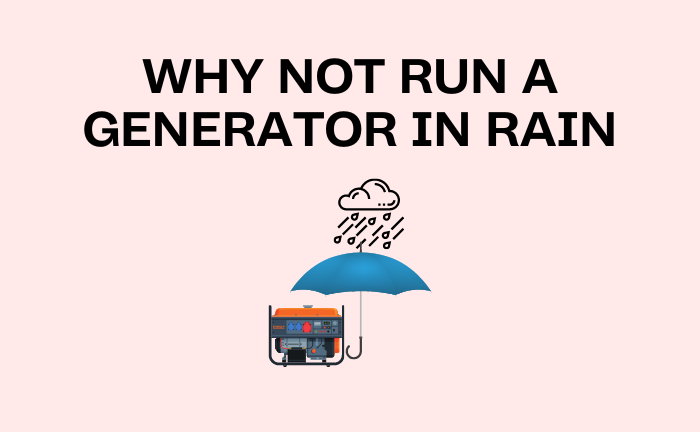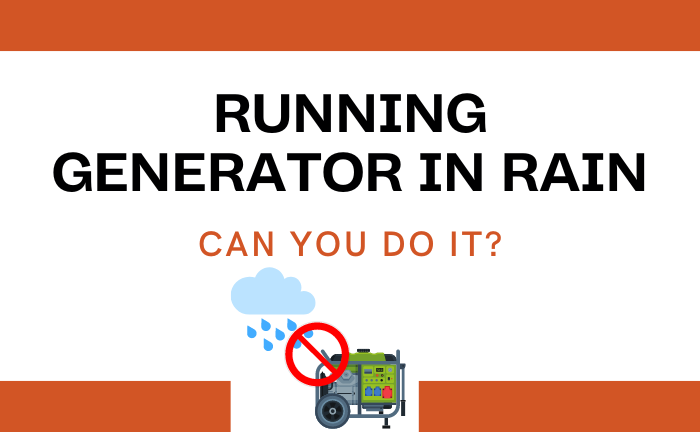Rain and thunder storming are often why power outage occurs, and this is when you need electricity the most. So having a generator in hand is a great convenience; however, many people wonder whether they can run their generator in the rain. Are you among them? Well, we have the answer for you.
No, running a generator directly in the rain is highly dangerous and could cause electrocution. Similarly, it could destroy the generator and damage its sensitive parts. So if you’re thinking of running a generator in either light mist or heavy fall, strike off your thoughts immediately.
However, if you’re in dire need of power and want to run a generator in an emergency, use a generator tent first and run it in its dry state. But running a generator while it is moist or wet is not recommended.
Table of Contents
Threats Involved In Running A Generator In Rain

Generators are designed to produce high-voltage power to light up the house and electric appliances. Hence, even slight moisture could cause great trouble to you and your loved ones. And to elaborate it more appropriately, we’ve shortlisted some severe threats involved in running a generator in the rain.
Could Catch Fire
Even if you’ve taken the precaution of covering your generator, you might still be at risk. Without enough ventilation, generators will not receive enough airflow to function correctly and may even catch fire.
Overloading and storing fuel too near to the generator are additional possible fire dangers. A car fire extinguisher nearby can help limit the damage, but it won’t do much to eliminate the risk.
Although you may keep a portable generator out in the weather when not in use, exposing it to the elements can result in additional maintenance and potential difficulties in the long term, which is why we recommend purchasing or creating a cover for your backup generator.
Damage Generator
A generator is a significant investment, and you probably want to retain it long-term if purchased, right? However, running a generator in the rain could cost your pocket a lot because water can damage many components and cause irreparable loss.
Some of the generator’s parts are not found quickly, and replacement could take considerable time. That’s why manufacturers clearly state to avoid water around the generator to prevent malfunction.
Electrocution
We have electrocution on our list, which could be the most terrible thing to your generator while running it in the rain. This may happen before and after a storm, and touching a wet generator while operating can be dangerous.
You may lessen the danger of electrocution by properly grounding your generator. Installing a portable ground fault circuit interrupter is the easiest method to accomplish this (GFCI). Learn more about dropping a portable generator.
It’s not only the generator that might give you a severe shock. Even the greatest GFCI won’t help if you’re standing in a puddle while running the generator.
Only run the generator while standing on dry ground, ideally under some shade, for your safety and the protection of the generator.
Safety Tips To Run Generator In Rain

Although running a generator in the rain is dangerous, you can still use it by adopting our following safety tips. Let’s check them out as follows.
Cover Generator
No matter how waterproof your generator is, it is mandatory to cover it from rain. Exposure to water could cause electrocution and put down your house at risk. Moreover, it could also damage the irreparable parts, so use a cover before running the generator.
You can use a steel enclosure on your house to prevent the water from coming near the generator. Similarly, you can use a generator cover as well.
Ensure Ventilation
Because generators burn fuel to keep running, the gasses produced are hazardous to one’s health. Carbon monoxide (CO) is a worry whenever your generator is used in an enclosed location. Ventilation is as essential as excluding water from the generator.
Ensure the exhaust exits the area if your generator is enclosed in a steel enclosure. Ventilation shutters are often integrated into purpose-made squares. Excess heat can also build up in confined locations, causing your generator to overheat. When temperatures rise in a confined space
- Your generator may cease operating or operate at a reduced capacity.
- Products in the vicinity may melt.
- The generator casing might catch fire.
As a result, proper ventilation is required for your covered generator.
Avoid Using Generator In Extreme Weathers
No matter how long you’re out of power, if weather conditions are extreme, it is wise to avoid using a generator. During an emergency, a working generator is an essential tool. However, when it comes to a generator for hurricane season or a winter storm, it is advisable to use it after the storm has passed, not at the peak of the terrible weather. Why?
While turning on your generator as soon as your power goes out may be tempting, it is advisable to wait until the winds have died down. Tornadoes often last less than 10 minutes, so you shouldn’t have to wait long.
Purchase A Reliable Generator
Although the best way to avoid any harm to your generator or danger to yourself is to keep it dry at all times, still, with a quality generator, you can be assured that your machine’s delicate parts are better safeguarded.
Wrapping Up
Here we conclude our topic about whether to run a generator in the rain or not? No, because exposing a running generator directly to water could cause severe damage to its components and put your life at risk.
So applying a proper safety procedure could save you considerable time.

